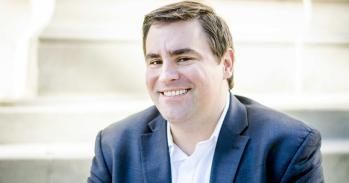In a new film, Dr Jane Goodall DBE talks about the environmental crisis and her reasons for hope.
In a new film, Dr Jane Goodall DBE talks about the environmental crisis and her reasons for hope.
Every single day that we live, we make some impact on the planet. We have a choice as to what kind of impact that is.
Jane Goodall
At the age of 26, Jane Goodall travelled from England to what is now Tanzania, Africa, and ventured into the little-known world of wild chimpanzees. Among her many discoveries, perhaps the greatest was that chimpanzees make and use tools. She completed a PhD at Newnham College in Cambridge in 1966, and subsequently founded the Jane Goodall Institute in 1977 to continue her conservation work and the youth service programme Roots & Shoots in 1991. She is an Honorary Fellow of Darwin College, Cambridge. Dr Goodall now travels the world as a UN Messenger of Peace.
Her words below (from the latest issue of Horizons magazine) continue our focus on Sustainable Earth, looking at how we transition to a carbon zero future, protect the planet's resources, reduce waste and build resilience. See also the newly released film.
“In 1986, I helped organise a conference on how chimpanzee behaviour differed according to the environment. There was a session on conservation and one on conditions in captivity – in both cases, it was utterly shocking. I went to the conference as a scientist, and I left as an activist.
"Since then, I’ve been travelling the world raising awareness not only of chimpanzee conservation and welfare, but also of wider environmental issues.
"We have just one home, one planet, and we’re destroying it very, very fast. The human population is growing, but on a planet with finite natural resources, and we’re using up these resources faster than nature can replenish them. We’re polluting the air, the water and the land. We’re recklessly pumping out CO2 into the atmosphere and, at the same time, we’re destroying our forests and oceans – the two great lungs of the world. If we carry on with business as usual, in 20 years’ time, we may have a planet that’s virtually unliveable.
"We must not give up hope. Every single day that we live, we make some impact on the planet. We have a choice as to what kind of impact that is.
"I see reasons to be optimistic. Nature is resilient. If we work to restore those places that we have destroyed, if we give them time, they will recover. A bleak, destroyed area can become beautiful again as the insects and birds and other animals come back. Animals on the very brink of extinction can be given another chance.
"I truly believe we have a window of time during which we can begin to heal some of the damage we’ve inflicted and at least slow down the climate crisis. But we have to act now.
"My greatest hope is our young people. There’s a saying, ‘We haven’t inherited this planet from our parents, we’ve borrowed it from our children’. But we haven’t borrowed our children’s future – we’ve stolen it. In my travels, I have met so many young people who seemed depressed, angry or just apathetic, feeling that their future has been compromised and that there’s nothing they can do about it. That was why we started our Roots & Shoots education programme in 1991, to empower young people to make the world a better place.
"Cambridge, like all universities and schools, can play a role in shaping the attitudes of young people. We need to educate and inspire them, to teach them to respect each other and to respect other living organisms. We need environmental concerns to be taught not just in science, but in every discipline.
"We are finally beginning to use our intellect to come up with technological solutions that will enable us to live in greater harmony with our planet – electric cars and renewable energy, for instance – and to think about our own ecological footprints. We need the scientific endeavour for which institutions such as Cambridge are famous to be directed towards doing something about the mess that we’ve made of our planet.
"The human spirit is indomitable. Throughout my life, I’ve met so many incredible people – men and women who tackle what seems impossible and won’t give up until they succeed. With our intellect and our determined spirit, and with the tools that we have now, we can find a way to a better future.
"But do we have time? I don’t know.”
Read more about our research linked with Sustainable Earth in the University's research magazine, download a pdf or view on Issuu.

The text in this work is licensed under a Creative Commons Attribution 4.0 International License. Images, including our videos, are Copyright ©University of Cambridge and licensors/contributors as identified. All rights reserved. We make our image and video content available in a number of ways – as here, on our main website under its Terms and conditions, and on a range of channels including social media that permit your use and sharing of our content under their respective Terms.




